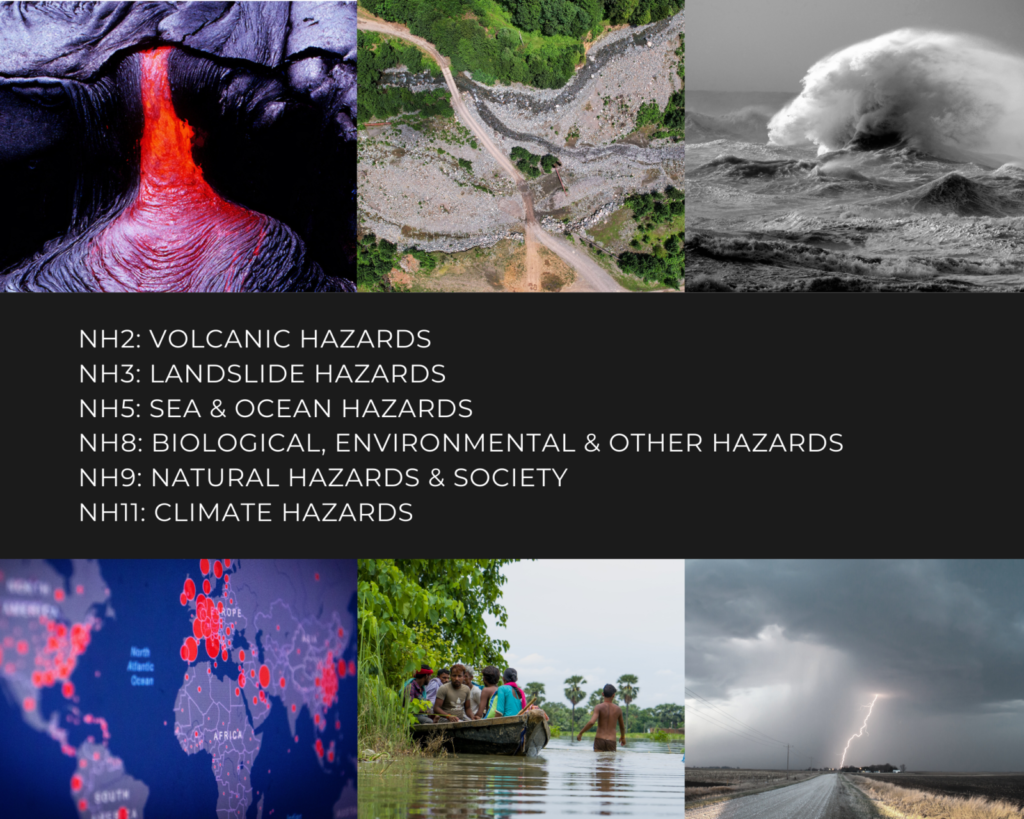Interested in getting involved in shaping the EGU NH Division? Interested in having an active role during the organisation of the annual General Assembly? Are you working in a field of research related to Natural Hazards? Then keep reading!
Our Division is seeking new volunteer Science Officers to fill in the role for the following subdivisions:
- NH2: Volcanic Hazards
- NH3: Landslide Hazards
- NH5: Sea & Ocean Hazards
- NH8: Biological, Environmental & Other Hazards
- NH9: Natural Hazards & Society
- NH11: Climate Hazards (NEW subdivision!!)
The term is fixed for a two-year period with a possible extension for another two-year period (maximum duration of a term is four years), from General Assembly to General Assembly (GA). Please, note these are not job positions, the time commitment is flexible and on a voluntary basis. Most of the activities can be carried out remotely.
What does it mean to become a Science Officer?
Let’s see together what your main responsibilities are.
There are a few main responsibilities related to the annual GA:
- June till Sept: session proposals are submitted for the next GA. Science Officers (SOs) at this stage control that their subdivisions are well represented, get in touch with potential conveners, propose new session topics, and revive previous years’ sessions proposals.
- Sept-Oct: finalisation of the session program for the next GA. At this stage, SOs evaluate the sessions of their subdivisions, and discuss with conveners the possible merging of sessions with very similar topics.
- Until Jan: abstracts acceptance. SOs advertise EGU, its sub-division and its GA sessions.
- Jan-March: we work with all the sessions and abstracts we receive to finalize the program. SOs are the first contact point of conveners and get in touch with conveners who missed the finalisation deadline; they can take the responsibility and finalise all the stages (for example, ranking travel awards, accepting abstracts, deciding about the status of the session) for the conveners. SOs communicate to the conveners regarding all questions and also coordinate session merging.
Outside the GA organisation, SOs are involved in:
- Organising other conferences under the EGU umbrella.
- Supporting our social media channels with information.
- Reviewing the keywords for EGU.
- Discuss and give timely feedback to EGU policies.
- Distribute new EGU information among conveners, authors or within your community.
- Advertise our Awards and Medals in your communities.
- Advertise our Journal NHESS.
- Advertise other EGU events and activities.
- Act in any way for NH Division improvement.

To apply to one of the positions, candidates should send
- a short motivation letter (inclusive of a brief vision of the sub-division: how you see it, which part would you like to strengthen, which topics to add, etc.),
- 1 page CV,
to egu.nhpres@gmail.com with a deadline for applications on 10 April 2022.
The selection process will be based on the evaluation of the experience carried out in the topic related to the selected subdivision, activity in international scientific associations, in addition to gender and country balance. The position is open for all career stages and specifically welcomes applications from early-career scientists.

Nikolaos Tavoularis
Dear Colleagues,
Based on this post (e.g. New Science Officers seeking), may I ask if this role is paid or it refers to a voluntary role?
Vale Cigala
Thank you for your question, Nikolaos.
The role is voluntary, not a paid position.
I realised we haven’t specified it in the text, I will correct it right away to make it clear!
Foretia
Are aspiring candidates outside EU eligible to apply?
Vale Cigala
Hello!
Yes, you can apply also if you are based outside the EU or you are not European. Also, most of the activities are carried out remotely.
The deadline is passed, but we did not receive many applications, if you are interested, please, consider applying.